How to Be a Digital Marketing Freelancer [The Ultimate Guide]
How do you imagine a digital marketing freelancer at work?
Are they sitting somewhere in a hotel in a warm country sipping alcohol-free pina-colada while being on a call with a client? Or maybe they are writing blog content lying on a beach with a beautiful ocean view?
That could be your scenario, but you also can’t skip the part where you’re struggling to find a project, can’t decide what exactly you will be doing as a digital marketer, and work low-paying jobs.
Indeed, sounds challenging, but don’t let go of your dream just yet – with proper preparation, you can make the transition to freelancing smoother. In our guide, we have everything you need for it.
Let’s dive in.
What Is Freelance Digital Marketing?
Freelance digital marketing is an occupation that implies providing digital marketing services to businesses, agencies, or organizations as a contractor, not an in-house employee.
Do the responsibilities of a freelance digital marketing specialist differ from an in-house marketing team employee?
Let’s see.
What Does a Freelance Digital Marketer Do?
Your duties will depend on the project you’ll be working on, but the most common freelance digital marketing activities include:
- Paid advertising or PPC: as a digital advertising manager, you will have to develop online ad campaigns and incorporate them organically in the client’s digital marketing strategy.
- Search engine optimization (SEO): here, your task will be to develop a business’s SEM (search engine marketing) and SEO strategy to improve its visibility in SERPs.
- Social media management: your main focus will be building social media presence and doing social media management for a company to improve engagement and brand awareness.
- Email marketing: your task is to develop an email marketing strategy to capture and nurture leads and run email campaigns to retain existing customers.
- Content marketing: your job is to create a content marketing strategy for a brand to improve its visibility and authority in its industry.
Of course, freelance digital marketing jobs don’t limit to these five – the scope is much broader. Actually, we’ve collected twelve possible jobs you can do remotely as a digital marketer – you can check all of them here.
Now, let’s talk about the skills needed to get one of these sweet digital marketing jobs.
What Skills are Needed to Become a Digital Marketing Freelancer?
Obviously, as a digital marketer, you will have to possess a set of hard skills based on your key responsibilities, no matter whether you’re working freelance or not. For instance, as a social media manager, you need to know how the key social media platforms (Facebook, LinkedIn, Twitter, Instagram, and YouTube) operate and how to analyze social media KPIs and do content creation (maybe even have some graphic design knowledge). The article we mentioned above lists hard skills for all digital marketing jobs.
However, you will also need soft skills that will help you do your digital marketing work more efficiently and put you in front of other competitors for the job (freelancing can be quite competitive). Here are three of those soft skills:
- Networking skills: these imply your ability to build a network of connections and develop long-lasting relationships and partnerships (empathy, active listening, and focus).
- Communication and sales skills: in a nutshell, it’s about your capability to deliver a clear message by interacting with others and creating a successful sales and marketing funnel by addressing the prospect’s product needs.
- Organizational skills: these skills imply how well you can organize your everyday work to ensure that an excellent result is delivered by a specific deadline (this is one of the must-have skills for all freelancers).
Now, let’s say you have the core skills to work as a remote digital marketer. How much can you expect to earn?
We have an answer in the next section.
How Much Do Freelance Digital Marketers Make?
Let’s take a look at different resources to understand what you can expect.
According to Glassdoor, the average yearly salary of a freelance digital marketer is around $59K. Entry-level specialists usually earn $49K, while the top specialists can expect up to $85K a year.
If we consider the statistics by Talent.com, it claims that the average annual salary for digital marketing freelancers is $68K and can go over $100K a year.
So, if we calculate the median pay, it will be around $60K yearly. This is a salary that most content managers and social media marketers make. However, if you choose a job as a brand strategist or product manager, your income can go well over $100K.
Now, of course, becoming a freelancer requires some investment in yourself as an independent contractor. For instance, you will need some equipment in your home office to do your job. Let’s see what this equipment includes.
What Kind of Equipment Do I Need to Be a Freelance Digital Marketer?
For most freelance digital marketing jobs, you will really only need a good laptop. Most of the work you’ll be doing will involve CMS, CRM, and other online tools and software, so a computer with enough memory and a good graphics card is what you need. If you happen to be looking for such a laptop, we have seven options for you here.
Aside from a computer, you should also secure the devices that will help you do your job efficiently. For example, if you pick up a project as a content manager and one of your tasks will be to run a podcast, the minimum equipment you will need includes a microphone and a pair of good headphones.
Additionally, content managers and social media marketers might feel the need for a good camera to produce visual content for a brand. You can also create a home studio where you can shoot videos, and for that, you will also need a video camera, a good microphone, proper lighting, possibly a green screen, and a production sound mixer. This way, you can also include video marketing in your services.
Now, let’s go through some of the perks and downsides of working as a digital marketer remotely.
Advantages and Disadvantages of Freelance Digital Marketing
After 2020, when many people were forced to work remotely, some professionals decided to switch to freelancing, and you can see why – it offers a great deal of flexibility.
However, working remotely as an independent contractor is not all fine and dandy either. There are some drawbacks that make people choose in-office positions over freelance jobs.
Let’s take a closer look at these pros and cons and discuss each of them in more detail.
Advantages of being a freelance digital marketer
Aside from working from whatever place you like, you can enjoy the following perks of being a full-time freelance digital marketer:
- Increased income potential: you can take on as many projects as you can handle. For example, you can both do content marketing for several companies – this will significantly improve your portfolio.
- Flexibility: this advantage is not just about the places you work from, it’s also about the projects you can take on. With freelance digital marketing, you’re not limited to one specific field – you can try your skills with different jobs and gain valuable experience.
- Independence: you’ll be working as an independent contractor, meaning you will be your own boss. You can regulate your working hours as you please, and you don’t have to worry about someone micromanaging you.
- Controllable workload: it’s the best part – you are the person regulating the amount of work to be done on a given day, so you can fit in other activities you enjoy.
Now, let’s consider the cons to help you understand whether freelancing as a digital marketer is a good option for you.
Disadvantages of being a freelance digital marketer
The first and most obvious problem with freelancing is that it requires strict discipline. If you lack organizational and time management skills, it will be hard for you to adapt to the home office, and you might find yourself procrastinating a lot.
Here are some other issues that freelance work involves:
- Lack of benefits: office jobs often provide health insurance, retirement accounts, paid vacations and sick leaves, and Fruit Fridays (not that important but still enjoyable). As a freelancer, you will have to pay for all of that yourself. Besides, you probably won’t be able to take as many vacation days as you want – a survey says 92% of freelancers can’t take a non-working vacation at all.
- You must handle everything yourself: you can’t delegate your job to anyone. Apart from that, you will also need to figure out how to do your own taxes and organize marketing business operations, which can take a while to learn.
- Loneliness: working from home all the time can impact your social life. That’s why some freelancers choose to work from local cafes or coworking spaces to be around people.
- Lack of steady cash flow: even though you can take on as many projects as you want, most of them don’t last longer than a month, so, at one point, you might find yourself out of work. Apart from that, at the beginning of your freelance career, you may find it challenging to land projects that pay well – you need to be ready for that.
Can we say that the pros outweigh the cons when it comes to working as a freelance digital marketer?
It’s 50/50. Even though flexibility is great, you will still have to go through the phase of low-paying jobs to make yourself recognizable. However, think about it as an experience that will go into your portfolio and make it more diverse. Eventually, a number of low-income projects will land you a lucrative offer.
Now, let us guide you through the process of becoming a freelance digital marketing specialist.
A 9-Step Process to Become a Digital Marketing Freelancer
So, how to become a freelance marketer?
It’s a serious decision, and you shouldn’t jump right into it without planning. Otherwise, when things take the wrong turn, you might feel disappointed and lose the desire to keep going.
To help you prepare for this change in your career, we’ve put together nine steps that will allow you to adapt and maintain a work-life balance.
Step #1: Decide what services you’re going to offer
As we mentioned earlier, you have quite an extensive list of digital marketing jobs to choose from as a freelancer. Besides, it might be tempting to start working in a few different directions, for instance, social media marketing and PPC, but over time you may find it hard to keep up, which can result in burnout.
Instead, try to choose a single specialization and develop your skills gradually. This way, you will also build up your expertise.
We’d recommend considering your personal traits when choosing the digital marketing services to provide. If you’re an extrovert, you might enjoy a job that involves daily communication (product manager, brand strategist, and so on).
No worries – there are plenty of options for introverts in digital marketing, too. For instance, you can work as a data analyst – a job that doesn’t necessarily require interacting with others. SEO jobs are also great for introverted people.
Besides, studying your skills can help you figure out what services to offer. If you have some experience in creating promotional texts, you can try content writing or copywriting. In time, you can also grow your skills to become a content marketer who not only writes texts but also edits them, manages a team of copywriters, and runs a content strategy.
Suppose you know what services you’d be offering. What niche should you choose? Would there be a demand for your experience and skill set?
Let’s answer these questions.
Step #2: Choose your niche
When picking a niche for your digital marketing services, you need to follow a familiar rule – do not try to reach a big target audience just for the sake of building up your portfolio. Otherwise, you risk becoming a Jack of all trades, a master of none.
So, how to find the right niche for your services?
You can follow something called the Passion-Positioning-Demand-Experience model:
- Passion. This first component speaks for itself – you need to determine the spheres of digital marketing that interest you the most and would make you feel helpful and valued. Also, what topic makes you so excited that you’d find yourself researching it for hours? It shouldn’t necessarily be related to online marketing – your niches of interest may include healthcare, e-commerce, manufacturing, or other industries.
- Positioning. Here, you need to choose who would benefit from your services the most – big corporations or small businesses and startups, SaaS business or e-commerce stores, etc. Your choice will help you define the growth strategy for your business as an independent contractor.
- Demand. Research the need for your skills in the industry of your interest. Aside from googling, you can also search forums like Reddit or Quora to see what digital marketing issues people from a given industry are trying to tackle. For instance, this Reddit user working in the healthcare industry struggles with bringing traffic to their website. So, there is a need for an SEO specialist in this industry:
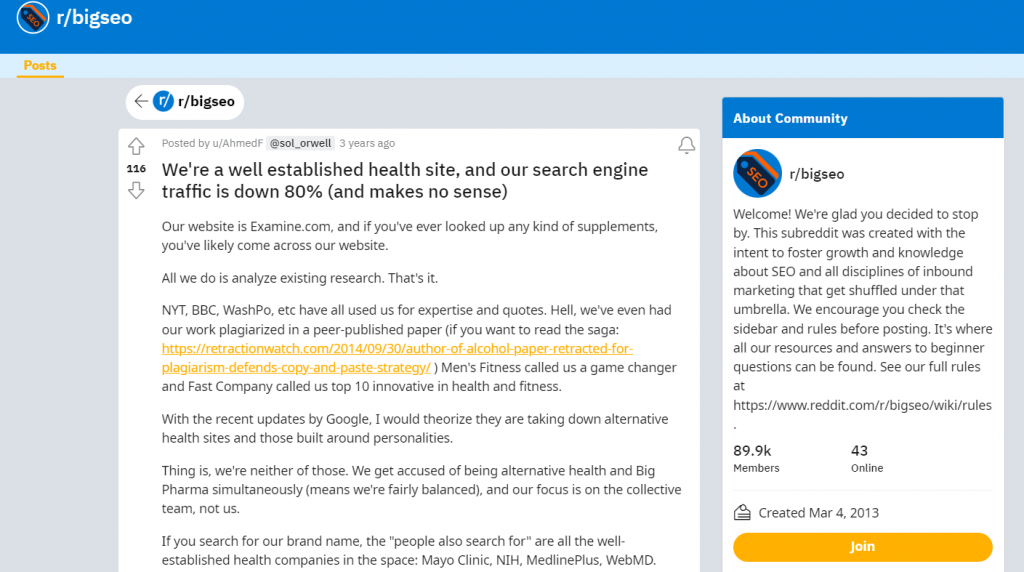
- Experience. Lastly, evaluate your professional background and whether it’s enough to start picking up digital marketing projects for specific services in a particular industry. You may start with some entry-level activities and gradually work your way up.
It’s also important to test your niche choice. Try to search for businesses already using the services you want to provide as a freelancer. If you find none, you should reconsider your choice. Talking to potential customers can also be of great help.
Now, let’s see how to set up prices for your freelance digital marketing services.
Step #3: Choose your pricing mode
How much should I charge for freelance digital marketing?
You might be tempted to charge as little as possible just to get a project. However, beware – it devalues your services and makes it harder to convince potential clients that your expertise actually costs more.
So, don’t make rushed decisions. Instead, do competitor research to see what prices freelancers with the same experience and skill level as you charge for what they do.
After that, you can pick one of the four pricing models you find most suitable for your services. We’ve put all of them, along with the pros and cons, in a convenient graph for you:
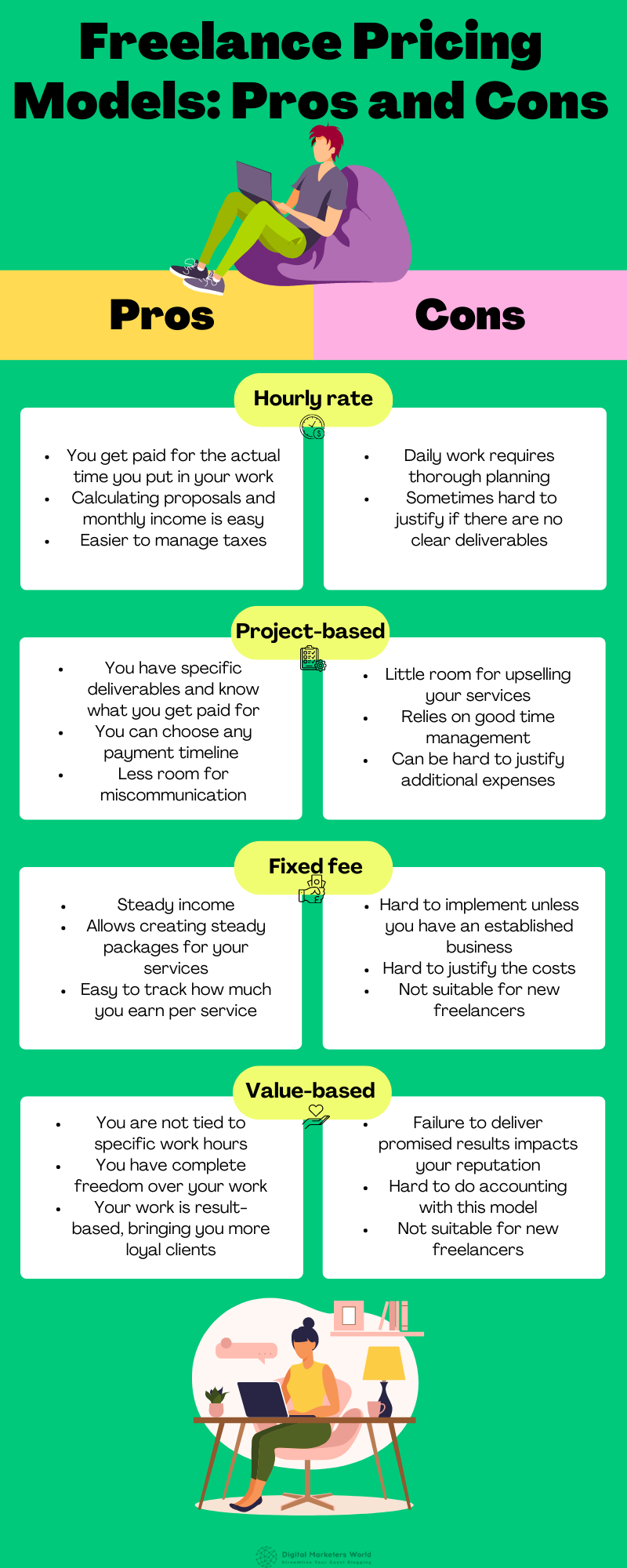
Now, let’s discuss each of the models in more detail:
- Hourly rate. Here, you need to calculate the work done within a given number of hours, plus other costs, such as benefits, health insurance, sick leave, etc. If you have no idea what the average hourly rate for your skills in a specific industry is, you can use this calculator by Clockify.
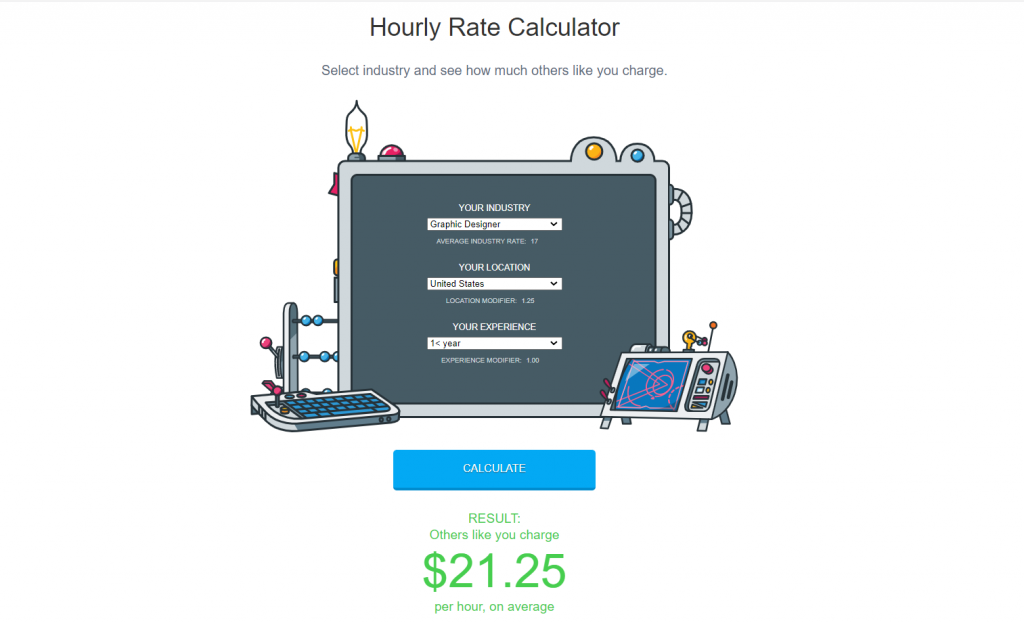
- Project-based. Essentially, you will only charge for your services when they get delivered. This pricing model is more flexible than the hourly one, as no one tracks your performance, and you can work at a convenient pace as long as the project gets delivered by the deadline. Choose this model if you know how to organize your work and how much time goes into delivering a given task.
- Fixed fee. Here, you get paid a fixed amount for the project. This model is even more flexible than the previous two, as you get to choose how often you will get the money for your work. For instance, you can break the project down into several deliverables and charge the client for each of them. Choose this model if you provide different types of services.
- Value-based. Here, you charge for the value you deliver. In this case, the client will ask you about the results you can bring, and if you reach or exceed them, you can charge for your services accordingly. This pricing model requires thorough preliminary research and a good understanding of the market to understand if your work can really be of high value. Don’t choose this pricing model if you’re just starting as a freelancer.
Before you begin earning money, you need to register as an independent contractor since you will have to pay taxes. Let’s see how to do it.
Step #4: Register your freelance business
Your activities as a freelance digital marketer will be regulated by the country or region where you’re located. So, make sure to consult an accountant and a lawyer to help you understand what legal entity you should register as.
We can walk you through the main steps of registering your freelance business just to give you an idea of what it involves:
- Consider what type of business entity you are. Freelancers in most countries can register as a sole proprietorship, LLC, or corporation. These entities differ in size and liability. If you’re a sole proprietor, all your debts and assets will be ascribed to you as a business owner. If you don’t want that, you should register as a limited liability company, which means that you as a person are not responsible for the debts of your business.
- Pick a location to register your business. Here, we mean choosing the physical address. You can either pick the country of your citizenship or get an e-residency, a business license, and an address to register your business in a different country, such as Portugal, South Africa, Brazil, Japan, and the United States. However, make sure to check the laws that regulate an e-residency program in a given country.
- Send a business license application. After choosing the business entity type, you need to get your business license. If you’re located in the US, visit the IRS portal.
- Pay taxes. When your freelance business becomes operational, it’s time to start paying taxes. Depending on the business entity type, you will need to pay them quarterly or yearly. It’s best to get in touch with an accountant to learn what taxation rules you need to follow.
Remember that we don’t provide a legal consultation, so make sure to check the laws and regulations of your country or state to register a freelance entrepreneur.
Step #5: Set up your online presence
The next step to get into freelancing as a digital marketer would be to establish your online presence. Start doing it before registering as a business – you will need a platform where people can check out your portfolio, client success stories and work experience.
In fact, you should have several active platforms to promote your freelance services:
- A website or a blog with a landing page. It is a perfect place to show off your portfolio and expertise. You will also need to work on getting your blog noticed and increasing traffic to it to make sure people spot you before your competitors.
- A LinkedIn profile. An active account on LinkedIn showcases your experience and skills, for which you can get endorsements from your previous employers and clients. You can also run your LinkedIn page as a blog to share your expertise and valuable insights with other industry players.
- A Twitter profile. Similar to LinkedIn, you can use Twitter to promote your freelance services, share ideas, connect with industry influencers, and particulate in discussions.
You can also advertise your portfolio and look for job postings on websites like Fiverr and Upwork. These platforms are also perfect for finding freelance job opportunities.
But how to find freelance work as a digital marketer if you’re just starting out? Where to look for your first client?
Let’s find out.
Step #6: Find your first clients
Many people romanticize freelancing, emphasizing the flexibility it offers. However, everyone tends to forget how hard it is to pave the way. The freelance market is very saturated and competitive, so don’t be surprised if finding your first client turns out pretty challenging.
Another false belief is that a freelance job opportunity will find you on its own. It could, but only after you become a well-known marketing professional in your industry. Before that, you will have to look for projects yourself. Here are four tactics you can employ:
- Cold emailing. You may know cold emailing as an outbound lead generation strategy, but you can also use it to find freelance marketing jobs. Simply research the business, identify the person to contact, work out an engaging message (which should be 100% personalized), and don’t forget to follow up if you don’t receive the answer within one week or so. You can also request a guest post opportunity to promote your business.
- Social media and ads. We already mentioned that you need to build your presence on LinkedIn and Twitter and maintain it consistently. You can also run Facebook ads or Google ads to promote your services, but make sure you have a solid marketing portfolio by then. Otherwise, people will perceive your ads as clickbait. By the way, don’t forget that you can advertise your marketing services in other marketing channels, such as appropriate groups on social media, too.
- Freelancing platforms. You remember from the previous section that you can search the client base of the freelancing websites like Upwork and Fiverr. Outsourcely, Credo, and Freelancer.com are also great places to start. Recruiters on these platforms are verified, so you don’t have to worry about being scammed. But to ensure your security, these websites take a commission from you. Digital marketing agencies are also a good option.
- Ask in person. If your network of connections is broad, you can ask them for referrals or to recommend you as a digital marketing manager.
Keep in mind that none of these tactics will work if you don’t have a digital marketing portfolio. We’ve talked about its importance here and there, but how can you actually build a good one?
Let’s find out.
Step #7: Create your portfolio
A good portfolio should tell a story, no matter what purpose it serves. In the case of a digital marketing freelancer portfolio, it needs to present information about your experience in a way that would put you before your rivals for the job.
How can you achieve that?
First, visuals are a must, particularly if you work with content. For instance, if you are looking for a project as a content creator/manager, your portfolio should showcase your previous marketing work to help the client understand if you’re a good fit. If your portfolio is on a freelancing website, like Upwork, you can add all the visuals to your profile:
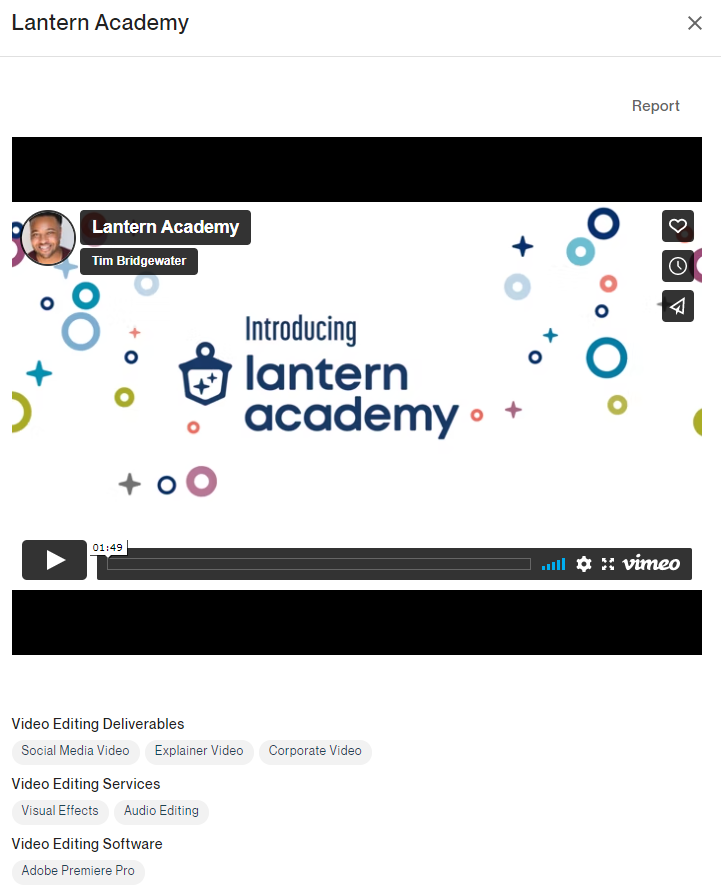
What if your previous jobs have nothing to do with content?
In this case, use storytelling in the form of:
- Case studies
- Use cases
- Statistical results
- Testimonials
- Screenshots from Google Analytics, Google Search Console and other tools to prove results of your digital marketing campaigns
Here, it is also important to mention that the descriptions of each project in your portfolio mustn’t be scarce. The more details you go into, the better, as it will show the client whether you have the right expertise for their project.
Finally, we need to emphasize that you should be working on your portfolio in dynamics. In other words, it should be updated regularly to show the growth of your personal brand.
Aside from the overview of your years of experience, another thing you should work on is your processes. Let’s see how to set them up to help yourself be more efficient.
Step #8: Build your processes
A successful freelance career and proper organization go hand-in-hand – there’s no way around it. We already mentioned the importance of discipline – you need it to stay focused, especially if you work in a place with many distractions.
However, even discipline won’t help you if you don’t have daily processes set up. Doing so can cut your workload significantly by automating certain tasks. Here are some of them:
- Project management. In particular, project management software can help you easily track tasks and deadlines, especially if you’re working on several projects simultaneously. You can also give account access to your clients, so they don’t miss task updates.
- Portfolio promotions. If you’re running social media ads to target new clients, tools like Hootsuite and Buffer can help you automate this process and collect new prospects who clicked on your advertisement.
- Email outreach. If you’re working as an SEO or link builder, and your task is to build a client’s backlink profile, email outreach tools will supply you with templates, personalization opportunities, and other perks to speed up the process.
- Invoicing. Online platforms like Bonsai, Freshbooks, and HoneyBook can automate your invoices, calculate taxes, and track the health of your financial profile. Besides, HoneyBook allows you to create contracts and manage them.
You may also want to invest in additional tools for time management, task tracking, and productivity, which can come in handy during the first months of freelancing.
Now, for the last step, let’s discuss the importance of working on your skills.
Step #9: Keep on sharpening your skills and promoting yourself
No matter how skilled you are and how great your education is, most things you’ve learned once will become irrelevant or less important one day. Thus, it’s crucial for a freelancer to stay in the loop and continuously work on both hard and soft skills.
The following activities should become a part of your workday to ensure that your services remain competitive:
- Subscribe to industry newsletters. They will supply you with your daily/weekly dose of news and help you keep up with industry trends.
- Sign up for work-related courses. Platforms like edX and Coursera provide online courses with certification, and Udemy and Skillshare host lectures from other professionals who share valuable insights.
- Join webinars. Many big industry players organize online events, some even offer certification. SEMrush, for instance, has many webinars on SEO trends that SEO professionals and content marketers will definitely find helpful.
Here, it’s also important to remind you that you should be as consistent in promoting yourself as a freelancer. Stay active on social media, participate in discussions, and expand your network to find new digital marketing job opportunities.
We’re done with our steps to becoming a digital marketing freelancer, but we still have a few tips to help make your professional journey smoother.
7 Tips for Digital Marketing Freelancers
The 9-step guide we’ve presented earlier is enough to get you started, but there are a few other recommendations you can follow to avoid unpleasant experiences and not stress out as much.
Let’s take a look at them.
Tip #1: Don’t rush on quitting your day job
If you want to become a digital marketing freelancer just to stop the vicious cycle of commuting to work, it may be tempting to quit your full-time job as soon as possible. Yet, neither in this nor in any other case, you shouldn’t make rushed decisions.
Ideally, you need to have at least three to six months of living expenses to cover your basic needs, from food to bills, and you can’t expect to earn that much when starting as a freelancer. Thus, the perfect solution is to stay at your day job for a while and start building your presence as a freelance professional at the same time to ensure a smooth transition.
Tip #2: Create a pleasant customer onboarding experience
Yes, just like with lead generation, you will need to nurture every new client through an onboarding experience. This process ensures effective two-way communication, better productivity, and reduced client churn.
Surely, you can interview the client and ask all the project-related questions. However, an easier way to document all the answers would be to run a survey where you can ask FAQs about invoicing rules, deadlines, goals, expected results, access to marketing tools, etc. Later, you can establish a project workflow based on the answers the client provides.
One more tip – check in with your client once in a while, as even the most optimized project workflow might eventually need changing.
Tip #3: Never stop learning
As we mentioned, you will have to work on your digital marketing skills continuously to remain competitive. But once you reach a certain level of professionalism, you won’t have to keep investing in your education, right?
Wrong. Digital marketing is a field that goes through constant changes. You can especially see it in search engine optimization, given how often Google rolls out new algorithm updates. Thus, no matter how knowledgeable you are, you can’t neglect continuous learning if you want to remain relevant in your digital marketing niche.
Tip #4: Leverage freelancer communities
Online groups and communities on social media are great places to look for new connections. Besides, you can find a suitable community created specifically for the type of freelance digital marketing job you’re interested in. For instance, here’s a Facebook group for freelance content writers:
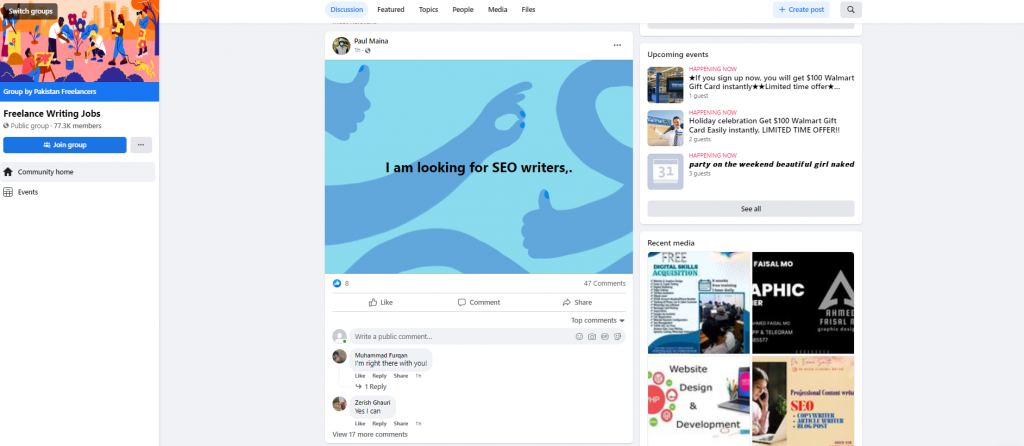
However, beware of scams – you may end up agreeing to a contract from a client who doesn’t pay. That’s why it’s best to look up this employer and their history or propose a contract on Upwork or any other similar platform to ensure that you get paid for your work.
Tip #5: Build a tech stack
As we mentioned in the eighth step to becoming a digital marketing freelancer, you will need to secure a tech stack before getting on this path. When you work in an office, all the software and online solutions are provided to you, but when you’re a freelancer, you will have to pay for them yourself (another reason not to quit your day job right away).
What does a tech stack include?
Digital marketing essentials – keyword research tools, backlink analysis solutions, email marketing software, project management software, CRM, affiliate marketing software, lead generation and capturing tools, and social media management solutions. The toolkit will depend on the nature of your job, that’s why it is so important to define your specialty beforehand.
Tip #6: Develop your negotiation skills
As a freelance digital marketing consultant, you will often find yourself negotiating project-related things – salary, deadlines, necessary tools, etc. Of course, you can’t expect all clients to be agreeable and open-minded. That’s why your negotiation skills need to be rock-solid.
Here, it is important to highlight that good negotiation skills go hand-in-hand with research skills since you will frequently have to look for objective reasons that justify your point of view. Besides, all your offers need to be based on in-depth industry research to convince the client that you’re the right person for the job.
Tip #7: Always stay organized
We’ve mentioned repeatedly throughout the article how important it is to be organized and disciplined as a freelancer. These personal qualities impact your productivity short-term and your reputation in the long run, so there is no compromise here – you must learn how to be organized.
How?
If you find it hard to concentrate with all the distractions around you, some tools may help. Those constantly checking out their phones will benefit from Forest App – if you touch your phone before the timer goes off, you’ll kill the tree you’ve planted. Pomodoro technique applications work in the same way.
Building a simple daily schedule is another option. Just list the tasks from high- to low-priority and follow them in that order. This approach helps with self-organization immensely.
Now Over to You
Indeed, becoming a digital marketing freelancer is quite a journey. The main point of view we want you to remember here is that hard work goes behind it, so you have to be ready for it. Doing freelance digital marketing from home is possible, but you need to prepare.
One tip stands out if we sum up all the recommendations given today – go heavy on the research and study the niche you’re entering with your digital marketing services. The demand for your skills is everything, so if there’s no need for them in a particular niche, you will be wasting your time.
But is freelancing as a digital marketer worth trying?
Absolutely! We recommend starting with it part-time just to test the waters. However, if you do everything right and approach it consciously, you have all the chances to build a successful digital marketing career and become a renowned expert.
Have you already started your journey as a digital marketing freelancer? Then, by all means, stick to our blog – we have many insightful guides and articles to help boost your skills.

Mariia is a content strategist and editor at Digital Marketer’s World. She is passionate about educating others on all things marketing and believes in the power of the written word.
